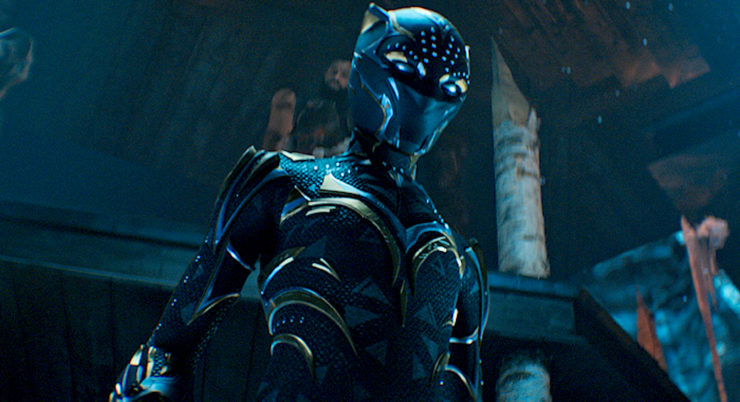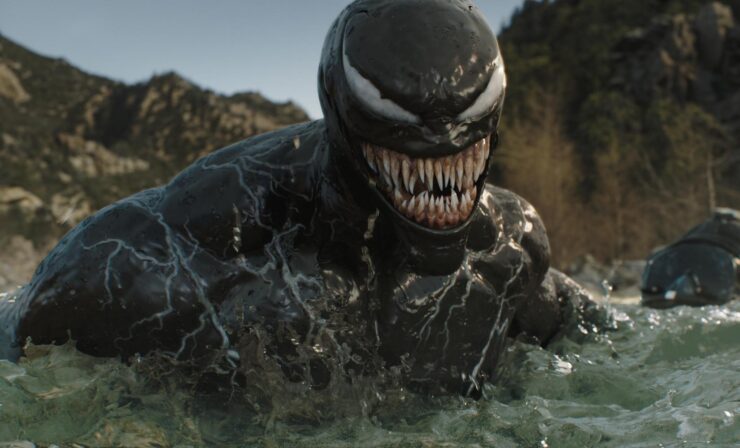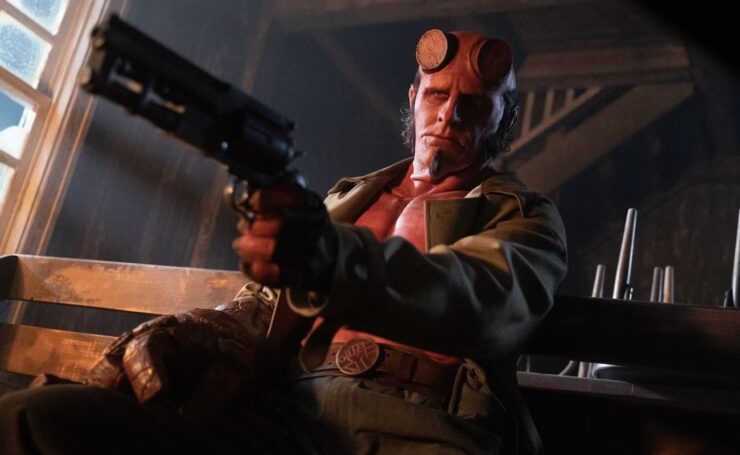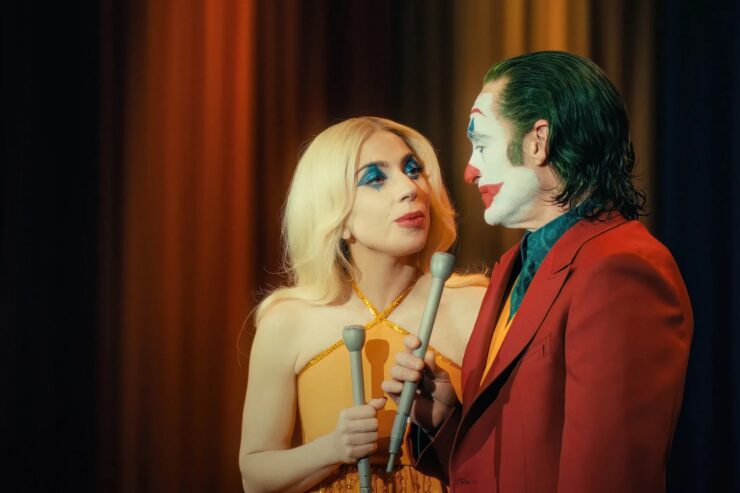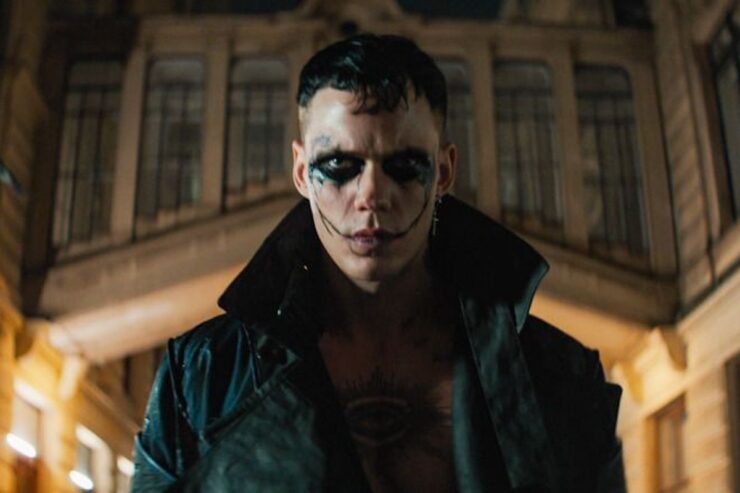From August 2017 – January 2020, Keith R.A. DeCandido took a weekly look at every live-action movie based on a superhero comic that had been made to date in the Superhero Movie Rewatch. In this latest revisit we’ve covered a few older films—Barbarella, Vampirella, and Sparks—and the recently released Thor: Love and Thunder, Samaritan, Black Adam, and finally Black Panther: Wakanda Forever.
Chadwick Boseman’s unexpected death in August of 2020 came as a complete shock to the entire world—not just to the general public, but to the folks at Marvel Studios in general and the people responsible for making the eagerly awaited sequel to Black Panther in particular. Indeed, Ryan Coogler had already written one draft of the script to the film subtitled Wakanda Forever when Boseman passed away.
In addition to absorbing the blow of losing such a young and vibrant talent, it was clear that Coogler would have to completely rejigger his plans for the future of the character. There were several ways to approach this unforeseen dilemma, though whatever decision Marvel made would have to happen fast, as they were already in preproduction. Re-casting was considered. It would hardly be the first re-casting in the Marvel Cinematic Universe, as the characters of Bruce Banner, James Rhodes, and Thaddeus Ross can attest.
However, none of those three examples are true comps for this situation. Boseman was incredibly beloved in the role, a huge role model, a strong actor, and also by all accounts a great person.
Ultimately, they decided to follow the comics’ lead and make T’Challa’s sister Shuri—already a breakout MCU character as played by Letitia Wright in Black Panther and Avengers: Infinity War—into the new Panther.
(For an in-depth contribution to this discussion, I strongly recommend author/screenwriter Steven Barnes’ lengthy treatise on the subject on Medium.)
In addition, this movie introduced Namor the Sub-Mariner to the MCU. One of Marvel’s first-ever superheroes, Namor was created in 1939 by Bill Everett, appearing in Marvel Comics #1, alongside stories featuring the Human Torch (actually an android), the costumed detective known as the Angel, the Western hero the Masked Raider, and the jungle lord Ka-Zar.
Buy the Book
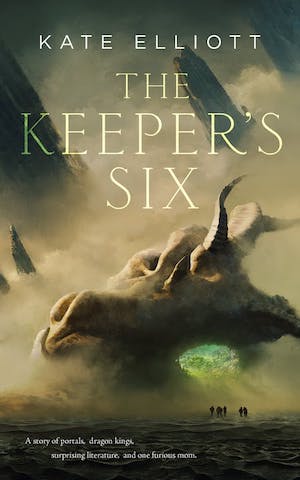

The Keeper’s Six
Namor was the hybrid son of a human sea captain and the water-breathing princess of the undersea nation of Atlantis. Having his father’s pale skin rather than his mother’s blue epidermis, he was an amphibian, and would sometimes make war on the surface world. Namor has been both an antagonist and hero over the last eight decades, including fighting alongside Captain America and others against the Nazis in World War II. His popularity declined after the war, as it did for most superheroes, but he was brought into the modern Marvel Universe in the fourth issue of Fantastic Four in 1962. Over the years, he has continued to be both a good guy and a bad guy, and has had his own series, both mini and ongoing, multiple times since the debut of the Sub-Mariner comic in 1968.
One thing that both Namor and T’Challa have in common is that they are monarchs of “hidden” nations. Coogler’s original notion was to have Atlantis (renamed Talokan) and Wakanda come into conflict amidst the chaos of T’Challa recovering from the five-year blip chronicled in Avengers: Endgame. That is maintained in the final version, but instead the backdrop is the outpouring of grief over T’Challa’s death, which happens at the very top of the film. Namor has been reimagined as a Mayan figure even more ancient than the comics’ scion of the early twentieth century. (Talokan is named after Tlālōcān, a paradise from Aztec legend ruled by a rain god.)
Back from Endgame are Letitia Wright as Shuri, Danai Gurira as Okoye, Winston Duke as M’Baku, and Angela Bassett in what was just revealed this week to be an Academy Award-nominated performance as Ramonda. Back from Black Widow is Julia Louis-Dreyfus as Valentina Allegra de Fontaine. Back from The Falcon and the Winter Solder is Florence Kasumba as Ayo. Back from Black Panther are Lupita Nyong’o as Nakia, Martin Freeman as Everett K. Ross, Michael B. Jordan as the image of Killmonger, and Isaach de Bankolé, Dorothy Steel, Danny Sapani, and Connie Chiume as the Elders of Wakanda’s tribes.
Introduced in this film are Tenoch Huerta as Namor, Dominique Thorne as Riri Williams, Michaela Coel as Aneka, Mabel Cadena as Namora, Alex Livinalli as Attuma, María Mercedes Coroy as Namor’s Mom, Divine Love Konadu-Sun as Nakia’s kid, Richard Schiff as the U.S. Secretary of State, and Robert John Burke and Lake Bell as CIA agents. (The casting of Bell is an amusing touch, as she voiced Natasha Romanoff in the animated What If…? series)
Thorne will next be seen as the star of Ironheart. Louis-Dreyfus will next be seen in Thunderbolts. Freeman will next be seen in Secret Invasion.
“I am the Black Panther, and I have come for retribution!”
Black Panther: Wakanda Forever
Written by Ryan Coogler & Joe Robert Cole
Directed by Ryan Coogler
Produced by Kevin Feige, Nate Moore
Original release date: October 26, 2022
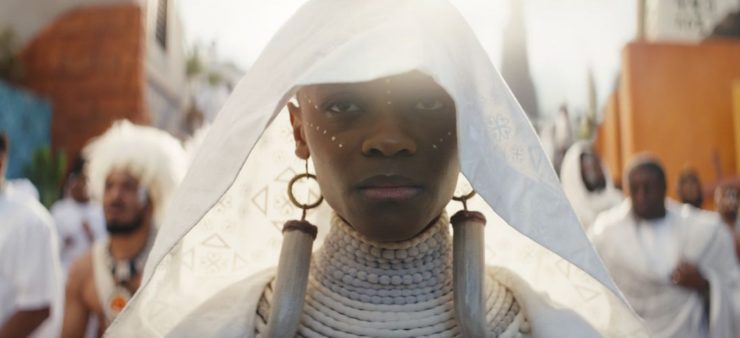
Shuri is working her ass off trying to find a way to cure T’Challa of the fatal illness he’s apparently suffering from by attempting to re-create the heart-shaped herb (which was destroyed by Killmonger). However, he dies before she can figure out a way to do so.
The nation mourns. Ramonda becomes queen, and she orders her daughter to continue to try to re-create the heart-shaped herb. But Shuri’s interest in doing so is gone, as she feels the Black Panther is a thing of the past.
One year later, Ramonda is facing pressure to share Wakanda’s vibranium with the rest of the world. She speaks before the United Nations, reiterating her position that it’s Wakanda’s vibranium, and no one else has a right to it. To accentuate the point, she has the Dora Milaje bring the mercenaries who were captured trying to steal vibranium into the conference chamber.
The U.S. government has a vibranium-detecting machine, and they’ve discovered some in the Atlantic Ocean. A SEAL team goes underwater to retrieve it, only to be ambushed and killed by water-breathing warriors, who also kill the CIA agents running the operation.
The CIA thinks that Wakanda is responsible for killing their team. The underwater warriors are in fact from Talokan, an undersea nation that, like Wakanda, has remained hidden—though unlike Wakanda, they don’t even pretend to be a regular nation, but instead stay completely off the radar of the “surface world.”
Ramonda and Shuri take some time to discuss their shared grief over T’Challa’s death. Ramonda has already burned her funeral robes, symbolizing the end of mourning, but Shuri is still wearing hers after a year. Their conversation is interrupted by Talokan’s monarch, Namor. He flies out of the water, having easily bypassed the Wakandan defenses, and delivers an ultimatum to Ramonda and Shuri: give him the person who created the vibranium detection machine, or he will truly invade Wakanda.
Shuri and Okoye are tasked with finding out who it is who created the machine. They enlist their favorite CIA agent, Everett Ross, who risks his job (not to mention his relationship with is boss, Valentina Allegra de Fontaine, who is not only the director of the CIA, but also Ross’ ex-wife) to provide them with a name.
The detector was created by an MIT student named Riri Williams. She thought that the vibranium detector was a theoretical thing, a school project, having no idea that the class for which she submitted the design was a cover for a covert CIA operation. Williams has also constructed her own Iron Man-style armor.

Okoye and Shuri find Williams at MIT—but so do the FBI (tracking Shuri and Okoye thanks to Ross being caught talking to them and put in jail), and so do the Talokans. A huge fight ensues with Williams and Shuri both captured by the Talokans. Okoye returns to Wakanda in disgrace, Ramonda stripping her of her rank and kicking her out of the Dora Milaje for losing Shuri.
Ramonda goes to Haiti, where Nakia has been living since Thanos’ snap, and asks her to be a War Dog once again. She goes underwater to Talokan to effect a rescue.
Namor gives Shuri a piece of the herb that provides the Talokans with superior strength and endurance. Then he tells Shuri his origin story: He was born of a Mayan princess in the sixteenth century, who, while pregnant with him, ingested a vibranium-infused herb to try to cure her and her people of smallpox. It worked as far as that went, but it turned them into water-breathers. Namor, however, was born an amphibian, and he now rules Talokan, which—like Wakanda—has its wealth and power provided by vibranium, and which he has kept hidden from the surface world.
Until now. He proposes two options to Shuri, who is heir to the Wakandan throne: an alliance or an invasion. Nakia’s subsequent rescue is successful, extricating both Shuri (who, to be fair, Namor was going to let go anyhow) and Williams (who he most definitely was not going to let go).
Williams is completely blown away by how awesome Wakanda is. Her tour is interrupted by Namor’s arrival. He tears through Wakanda, kicking everyone’s ass single-handedly, including starting a flood that nearly drowns Williams—but she is saved by Ramonda, who sacrifices her own life to save the young woman’s.
Shuri is able to use the herb Namor gave her to finally succeed in reconstructing the heart-shaped herb. She goes through the ritual of ingesting it and traveling to the Ancestral Plane, hoping to see T’Challa. Instead, she encounters Killmonger, to her disappointment. Killmonger reminds her that T’Challa was noble, and when his father was killed, he refrained from revenge. Killmonger, though, took the path of vengeance.
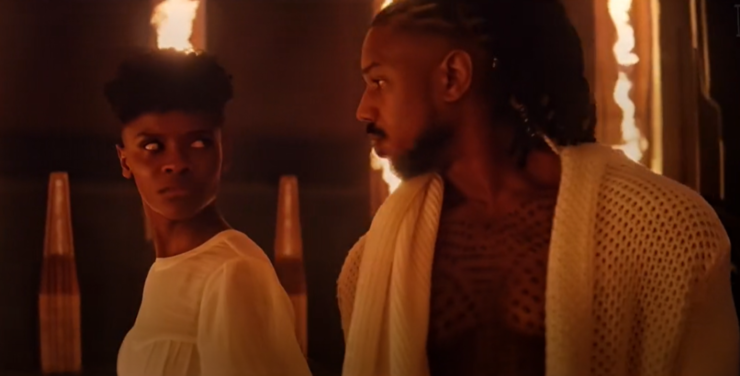
Shuri decides to follow her cousin’s path instead of that of her brother. She declares herself the new Black Panther. She is accepted by all five tribes, though M’Baku of the Jabari advises her against the course of action she’s going to pursue to avenge Ramonda.
Ignoring M’Baku, she orders a counterstrike against Talokan, setting out to sea in a heavily armed warship. She gives the Midnight Angel armor to Okoye and another Dora Milaje, Aneka, so they can join the fight from the air, with Ayo now the leader of the Dora Milaje. In the meantime, Williams has used Shuri’s lab to gussy up her homemade armor into something fancier.
The battle is brutal, especially since they’re on the ocean, so the water-breathing Talokans have the advantage. Shuri and Namor wind up fighting on a nearby island, after Shuri traps Namor away from water for a time. Before she can follow Killmonger’s advice and kill Namor, she remembers her mother and decides to show compassion, asking for his surrender in exchange for an alliance. Namor agrees. (He’s functionally immortal, he can bide his time, and besides, Wakanda and Talokan are stronger together than apart.)
Everyone licks their wounds and goes home. Williams leaves her armor behind and returns to MIT. (Why she doesn’t stay in Wakanda and keep her fancy-shmancy armor is left as an exercise for both the viewer and for the writers of Ironheart.) The two Midnight Angels spring Ross from prison, taking a certain amount of glee in the notion of two African women rescuing the colonizer.
When it comes time to choose the new ruler of Wakanda, Shuri is a no-show, with M’Baku instead stepping forward to claim the throne and ask if anyone will challenge him. For her part, Shuri has gone to Haiti to visit Nakia, who reveals that she has a six-year-old son, born months after Thanos’ snap: Toussaint, son of Nakia and T’Challa. There on the beach, Shuri finally burns her funeral robes.
“T’Challa was truly noble—are you going to be like him, or are you gonna take care of business?”
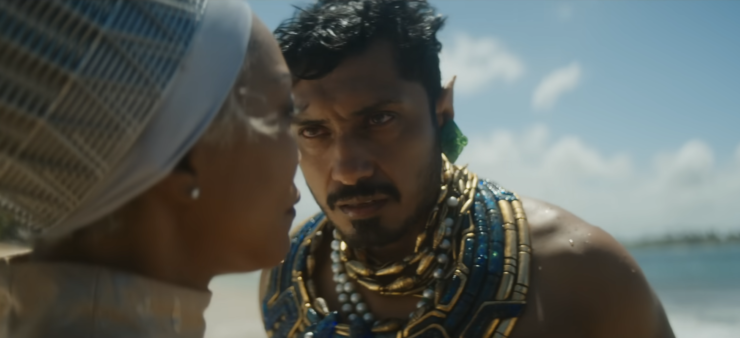
Jesus fucking Christ, are they going to kill off every adult woman who’s a recurring character in the MCU?
Once was annoying. Twice was tiresome. But we’re up to six in the last ten movies: Gamora in Infinity War, Natasha Romanoff in Endgame, May Parker in Spider-Man: No Way Home, Wanda Maximoff in Doctor Strange in the Multiverse of Madness, Jane Foster in Thor: Love and Thunder, and now Ramonda. Even if you give them a mulligan for Gamora, since we have an alternate version of her from Endgame forward, that’s still appalling. It’s at best lazy-ass storytelling, and at worst despicable misogyny.
This is particularly galling in a movie that, in general, does really well by the women in it. We’ve got a ton of great characters in this movie, and a plurality of them are female. Okoye is probably my favorite character in the entire MCU (I go back and forth between her and Peggy Carter), Ayo has slowly built up from first Dora Milaje on the right in Captain America: Civil War to a powerful character in her own right (both here and in The Falcon and the Winter Soldier), Nakia remains superlative, Namora is fantastic as the Talokan equivalent of Okoye, and de Fontaine is slowly building into a most interesting character whose loyalties are still not clear.
And then we have the triumvirate of fabulous in Bassett’s Ramonda, Letitia Wright’s Shuri, and Dominique Thorne’s Riri Williams.
Williams is a fabulous character, the opposite of Shuri in pretty much every way, and it’s so excellent to see that we can have two young Black women who Do Science who are totally not alike. Shuri is royalty, confident, always thinking three steps ahead. Williams, though, is from a much less privileged background and has had to fight for all her chances, and she’s much more seat-of-the-pants. It’s like people of color can have different personalities or something! (Also I love that her unknowingly creating a weapon for the government while at a major science institute reminded me of the plot of Real Genius.)
Thrust unexpectedly into the lead role by the death of her costar, Wright shines in this movie as a person in a thousand kinds of pain and no idea how to deal with it. One of the themes of several of the Marvel movies—particularly the ones featuring Thor and the Black Panther—is that being a political leader and being a hero are almost mutually exclusive callings. We already know that Shuri is a capable hero when she’s in her right mind based on Black Panther and Infinity War, but as a leader, she fails pretty spectacularly—for the same reason that she fails as a hero for a portion of this movie. She’s hurting so badly from T’Challa’s death—and her own sense of guilt over not being able to save him—that she’s not thinking straight. This results in a spectacularly wrong-headed assault on Talokan in which Wakanda nearly loses. Indeed, were it not for Shuri’s direct triumph over Namor, Wakanda’s forces—who are not pushovers—would’ve had their heads handed to them. Attacking someone who breathes water from a small ship (small, that is, by comparison to, y’know, the entire friggin’ ocean) in the middle of the Atlantic is not a well-thought-out strategy. Nor is it wise to choose a battleground where you can’t use your battle rhinos. (Yes, this makes three movies in a row with no battle rhinos. What the hell, people? I WANT MY BATTLE RHINOS!) M’Baku even told her that it was a bad plan, but he went along with it, because Shuri was queen at that point, and he does as he’s told. At least until he can challenge her, but we’ll get to that in a minute.
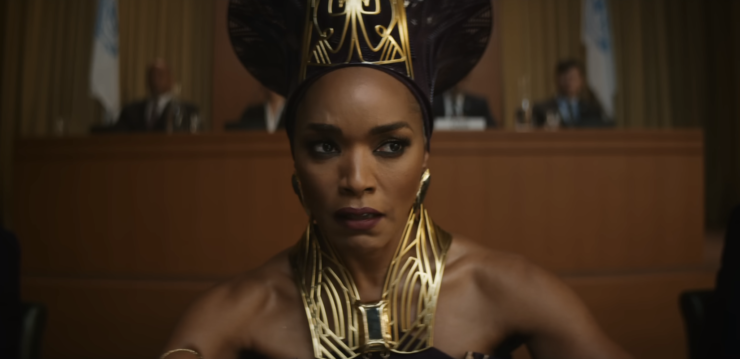
Finally, we have Bassett, and what the hell were they thinking killing her off? I was wondering for four movies why Ramonda wasn’t the one who took over ruling Wakanda when T’Chaka died, and this movie just proves that I was a hundred percent right to ask that question, because she’s phenomenally good at it. In fact, she’s demonstrably better at it than any of the other four members of her family we saw in the job (T’Chaka, T’Challa, Killmonger, and Shuri). The scene where she owns the UN, punctuated by the Dora Milaje dropping off the zip-tied mercenaries, is truly epic, her ranting at Okoye for losing her other child is devastating, and she generally brings a tremendous gravitas to the proceedings.
Killing her off doesn’t even make story sense, because the last thing Namor would want is a martyr. He wants to demoralize Wakanda, not piss them off. And then they gave Bassett a (deserved) Academy Award nomination, making the decision to kill her even stupider, in retrospect.
This movie is a superlative meditation on grief and grieving (the second one in Phase 4, following WandaVision). T’Challa’s passing is a miasma that suffuses the entire movie, warping everyone’s behavior in one way or another.
And Tenoch Huerta is a revelation as Namor. His portrayal isn’t quite perfect—he’s lacking Namor’s trademark haughty arrogance—but he has the charisma and anger and determination. I absolutely adore the decision to rethink his origin into something more Central American, and I very much look forward to seeing more of him going forward.
While it seems like the irrelevant doings of unnecessary White people, I enjoyed the bits with Ross and de Fontaine, at least in part because we finally know what the latter’s job is (it wasn’t at all clear from her appearances in The Falcon and the Winter Soldier and Black Widow), and besides, it’s never bad to have Martin Freeman around…
It’s also never bad to have Michael B. Jordan. I like that Killmonger’s ghost hangs a lantern on the fact that Shuri is going through the exact same thing that her brother went through in Civil War, but also they make the cameo work by using Killmonger as a symbol of Shuri’s anger. She doesn’t want to be a hero like her brother, she wants, like her cousin, to burn it all down. So of course Killmonger is who she sees in her heart-shaped-herb-induced vision quest…
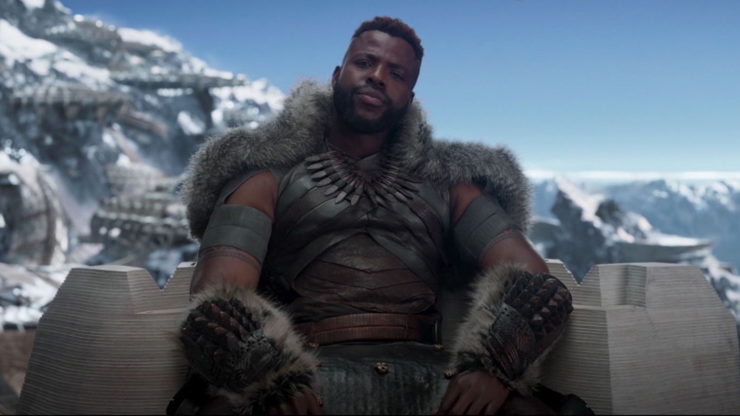
Last but not least, Winston Duke continues to steal the show as M’Baku. The ending seems to indicate that M’Baku is making a play for the throne. Civil War already made it clear that the monarch and the Black Panther do not have to be the same person, and I’m totally okay with Shuri sticking with the role of hero over queen.
Though we do have T’Challa’s son in the mid-credits scene, and I have to admit I had trouble even buying that whole thing. I find it impossible to credit that Nakia kept the kid a secret. Maybe during the Blip when T’Challa was dusted and the world was in chaos, I could see it, but afterward? Especially after he died? It makes no sense, as the boy should be raised in Wakanda where he can grow up and learn things in a technologically advanced haven, not a politically unstable island nation. Plus, the kid’s very existence feels like an attempt to reassure the audience that we won’t have icky girl cooties on the Panther suit for long…
Finally, is vibranium gonna be the thing that ties everything together the MCU together the way the infinity stones were? Because that got real tiresome—by the time we got to Doctor Strange’s revelation that the Eye of Agamotto was an infinity stone, I was ready to riot—and I’m not eager for that to be repeated…
To sum up, this is a movie that was made under the worst possible circumstance, and it winds up celebrating what made the one actor who couldn’t be in it so great. Regardless of how you feel about the greater issue of whether or not they should have re-cast (and I keep going back and forth on the subject, myself), the movie they did make is a powerful, brutal, brilliant movie that celebrates life and reminds of us of how hard death is to deal with—and the price of dealing it, too.
***
This concludes our semi-annual revival of the great superhero movie rewatch. The first half of 2023 promises Ant-Man & The Wasp: Quantumania, Guardians of the Galaxy Vol. 3, and Shazam!: Fury of the Gods, all of which (and possibly more) I’ll be looking at in June.
Keith R.A. DeCandido’s latest comic book work is the Resident Evil: Infinite Darkness five-issue comic book miniseries The Beginning, issue #2 of which will be out in February from TokyoPop. It’s the prequel to the Netflix animated series, and features fan-favorite character Leon.










